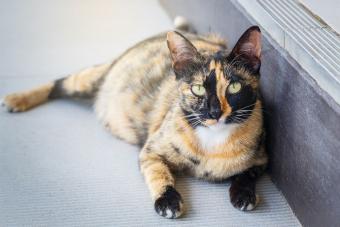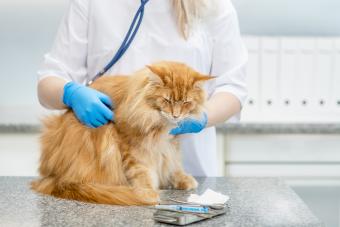
Finding out that your cat has a heart murmur can feel alarming. What does that mean for them, for you, and for your future together? Dr. Clare Deming, DVM, DABVP, advises, "If your cat is diagnosed with a heart murmur, it is important to figure out which type of murmur is present."
Some heart murmurs are harmless and don't need treatment or have any impact on a cat's quality of life, whereas others might require long-term medication or other treatments.
What Is a Cat Heart Murmur?
Dr. Deming explains that a heart murmur in cats is "an abnormal sound that can be heard through a stethoscope. Heart murmurs are caused by turbulent blood flow. Instead of producing a typical lub-dub sound, the normal heart noises will sound sloshy or will have a whooshing component to them."
"Heart murmurs are common in cats of all ages, and can be heard using a stethoscope as part of a physical exam by your pet's veterinarian." Dr. Deming tell us.
Causes of Feline Murmurs
There's no single cause of heart murmurs in cats and it's kind of relief to know that the presence of one doesn't necessarily mean your cat has heart disease. Likewise, cats without heart murmurs can have heart issues.
Murmurs can have many causes, anywhere from stress to thyroid problems. A few of the reasons your cat might have one include:
- Congenital heart defects
- Stress
- Anemia
- Dehydration
- Heartworms
- Hyperthyroidism
- Valve disease
- Hypertrophic cardiomyopathy (HCM)
Understanding Your Cat's Diagnosis

Your veterinarian probably gave you a "grade" along with your cat's heart murmur diagnosis. This number is important because it describes the severity. Heart murmurs in cats are graded on a scale from I to VI, with I being the mildest and VI being the most severe.
Dr. Deming explains, "A grade I heart murmur can barely be heard by your vet. The grade VI murmur is the easiest to detect and often completely obscures all normal heart sounds. With severe heart murmurs, you can feel the murmur through the chest, although this is more commonly experienced in dogs than in cats."
Your veterinarian will track the grade of the heart murmur. There's a chance that a low-grade murmur could resolve, especially in kittens. If the grade worsens or changes rapidly, it could point to something serious and warrant more tests.
Heart Murmurs in Kittens
How serious is a heart murmur in a kitten? It really depends on the underlying cause. Dr. Deming says, "Many kittens will have an innocent heart murmur when they are seen for one of their first check-ups. Your veterinarian will likely listen for the murmur at another visit. If it persists, or if the grade increases, then further testing for congenital heart diseases may be needed. If the murmur goes away as your kitten grows, then no other testing will be needed."
According to Dr. Deming, "Most heart murmurs are identified during routine checkups." These are referred to as incidental findings and often don't have any other signs or symptoms.
Prognosis and Treatment Options
The great news is that many cats can enjoy long, full lives with a heart murmur. Your veterinarian can give you more insight into your cat's quality of life, and depending on their age, the grade of the murmur, and other symptoms present, they might recommend these treatment options.
Medications
There's a whole slew of medications that your vet might prescribe to treat the murmur based on the cause. It's possible they'll recommend a diuretic, beta-blocker, ACE inhibitor, or anticoagulant to prevent blood clotting.
Lifestyle Changes
Your vet might recommend lifestyle changes to help your cat. These can include changing their diet to something with a low sodium content or removing stressors in their life.
Treating Underlying Conditions
If your vet discovers that the murmur is a result of an underlying disease like an infection, hyperthyroidism, or heartworms, they'll likely treat that condition first.
Surgery
Kittens born with heart abnormalities, like a hole in a heart chamber, might need surgery to repair the heart. This doesn't happen often, but it's something to be aware of.
Regular Veterinary Visits
Seeing your veterinarian regularly is one of the most important parts of treating a heart murmur. That way, they can listen to the heart to monitor the murmur's grade and perform any other tests.
Dr. Deming advises, "The best way to evaluate the heart for structural changes like cardiomyopathy is with an ultrasound. When an ultrasound of the heart is done, this is called an echocardiogram. This is a specialized test, and your veterinarian may refer your cat to a cardiologist if this is necessary." Keep up with these appointments as best you can, and report concerns to your vet if any pop up.
When to See Your Veterinarian
Along with routine follow-ups, it's important to know when to see your vet on an urgent basis if your cat has a murmur. Even though it's unlikely to happen, being prepared for anything and everything pays off. See your vet right away if your cat shows any of these signs:
- Low energy
- Weight loss
- Coughing
- Wheezing
- Panting
- Difficulty breathing
- Pale or purple gums
- Unable to use back legs
Dr. Deming says, "If your cat has any heavy breathing, this could indicate a build-up of fluid in the chest from congestive heart failure. Cats with severe respiratory difficulty may need to be hospitalized for oxygen or could require other procedures."
Cats Can Live Comfortably With Heart Murmurs
A heart murmur isn't a fatal diagnosis. Cats can live months to decades with a murmur. Dr. Deming advises that cat owners should "Follow your veterinarian's instructions for follow-up and testing carefully. If your cat is diagnosed with cardiomyopathy, keep up with your pet's medications and appointments so that she will have the best quality of life possible."







